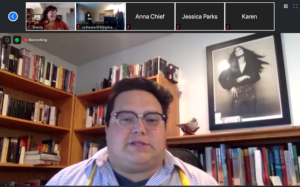Lakehead University Office of Indigenous Initiatives celebrates 180 Indigenous graduates

By Rick Garrick
THUNDER BAY — The importance of ceremony, breaking the cycle of poverty, discipline and facing challenges such as systematic racism were highlighted during the Lakehead University Office of Indigenous Initiatives’ online Indigenous Student Graduation Celebration.
“Somebody had said to me a month or so ago, ‘Oh, you just graduated from social work,’ and I said, ‘Well, I didn’t graduate from social work. I’ve finished my social work degree, but I hesitate to say I’ve graduated from it because to graduate from something implies that I’ve gone through some sort of a ceremony, and I haven’t really gone through that ceremony,’” says Clifford Mushquash, a Pays Plat citizen and Honours Bachelor of Social Work and Bachelor of Arts Sociology graduate. “So I’m thankful for tonight’s opportunity for what [Indigenous Initiatives] has put together for Indigenous graduates so we can now say we have gone through a ceremony. Ceremony is significant to our people — it’s an important milestone to many people for their lives.”
Mushquash says he had “kind of mourned” the postponement of Lakehead University’s convocation ceremonies due to the coronavirus disease 2019 (COVID-19) pandemic because he had been looking forward to walking across the stage and thanking the Elder he had grown close to and who had given him counsel, advice and support over the past four years.
“I am thankful that we have been able to have this opportunity tonight, and that Elder Gerry [Martin] was with us tonight and to be able to pray with us and share with us and share in ceremony with us,” Mushquash says.
Riley Corbin, a Biigtigong Nishnaabeg citizen and Bachelor of Education Concurrent with the Faculty of Social Sciences and Humanities graduate, noted how his parents’ achievements in postsecondary education enabled his path to further education.
“They had a tough road where they came from lower socioeconomic status, poverty, small northern isolation and then within one generation just how fortunate and privileged my own life has been because of their sacrifices and their ability to break that cycle,” Corbin says. “I just think there is hope for sure— there’s living proof that especially through education and an avenue that people can break that vicious cycle of poverty.”
The celebration, held June 16 on the Zoom platform, featured National Chief Perry Bellegarde as a keynote speaker as well as Fort William Chief Peter Collins and Chippewas of Rama Councillor Ted Williams as guest speakers.
“We’re living in a different world today,” Chief Collins says. “It’s always a challenge when we’re dealing with such a different world in many different fronts. You look at what’s going on in the world — systematic racism is still alive and well and there’s many challenges we need to face and we can face them together. That’s what my message has been to everybody; we can get through this together if we stay committed to making changes.”
Williams shared the four Ds of success with the graduates: desire, decision, determination and discipline.
“My personal favourite is discipline,” Williams says. “You will get sidetracked in numerous other activities which will crop up, try to shut you down from your goals, but you have to exercise your discipline because discipline is the habit that is necessary for achieving success today and in the future.”
Lakehead had about 180 Indigenous graduates this year. Other speakers included Moira McPherson, president and vice-chancellor at Lakehead; David Barnett, provost and vice-president (Academic) at Lakehead; Denise Baxter, vice-provost, Indigenous Initiatives at Lakehead; and Yolanda Wanakamik, vice-president, Lakehead Alumni Association.


